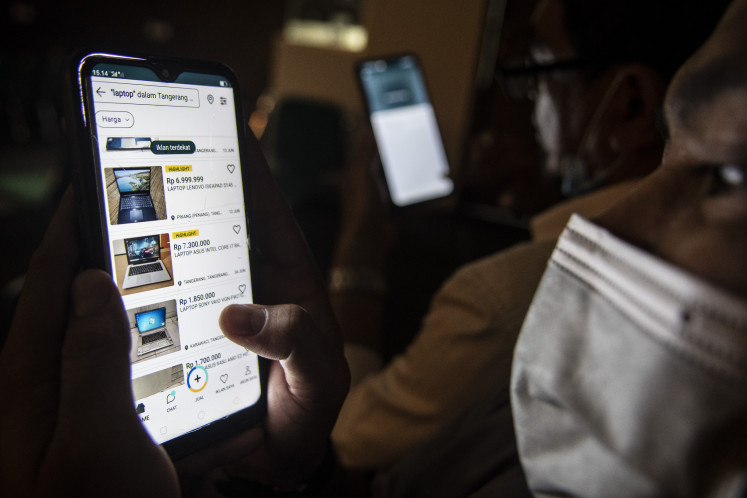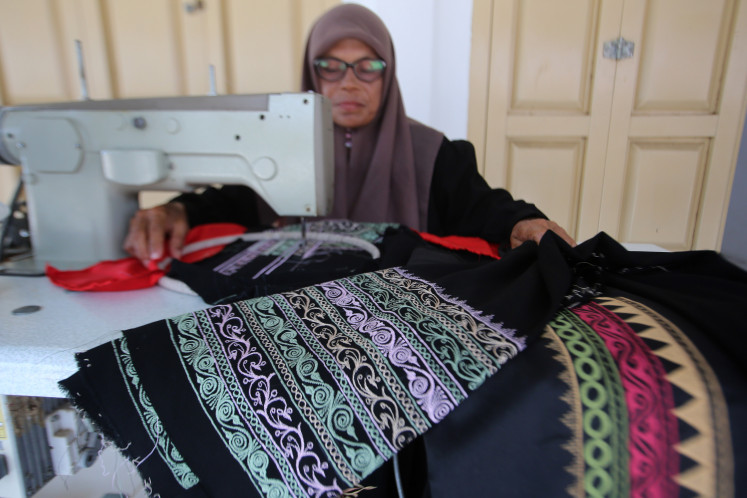Popular Reads
Top Results
Can't find what you're looking for?
View all search resultsPopular Reads
Top Results
Can't find what you're looking for?
View all search resultsMajor homework for Indonesia and Australia to implement IA-CEPA
Some may argue that this opportunity will boost Indonesia’s export to Australia. But, our recent discussions with some of Indonesia’s parliament members, owners of small/medium enterprises, and trade unions indicated that they are not aware of the benefits of IA-CEPA.
Change text size
Gift Premium Articles
to Anyone
P
resident Joko “Jokowi” Widodo’s visit to Canberra marked a new milestone in Australia-Indonesia’s relations.
Not only did he address Australia’s parliament on Monday, Jokowi also launched a plan of actions for Indonesia-Australia Comprehensive Economic Partnership Agreement (IA-CEPA), which finally has been ratified by Indonesia’s parliament last week.
This visit also commemorates the 70th years of Australia-Indonesia relations. It is also a sign that the two country relations are in the best shape.
IA-CEPA, as claimed by both countries, will open up more economic partnerships and thus complement the current strategic relations. Jokowi’s visit disproves the observation that unlike his predecessor Susilo Bambang Yudhoyono Jokowi disregards Australia as one of Indonesia’s good friends.
However, we should not get overly excited over the IA-CEPA yet. Even though the partnership has received positive responses from each country, IA-CEPA has some apparent implementation challenges.
Challenges to Indonesia …
That the agreement will further liberalise Australia-Indonesia trade and broaden economic relations is indeed inevitable. Indonesia will enjoy the benefit of zero tariffs for all exports to Australia, while it is also cutting 94% tariff for Australia’s exports to Indonesia.
Some may argue that this opportunity will boost Indonesia’s export to Australia. But, our recent discussions with some of Indonesia’s parliament members, owners of small/medium enterprises, and trade unions indicated that they are not aware of the benefits of IA-CEPA.
Instead, there are growing anxieties that they will not be able to take advantage of the agreement, given Indonesia’s current trade deficits with Australia. This trade deficit, exacerbated by the competing trade structure of the two countries on mining sectors have left them clueless about the initiatives to increase Indonesia’s export to Australia.
On the other hand, in the context of investment, this agreement is also momentum for Indonesia’s government to ease its bureaucracy. Our colleague, a junior Australia’s diplomat, finds it surprising that despite Indonesia’s reputation as a democratic country, its administration for investment is still too much a hassle.
This can limit Indonesia’s attractiveness to foreign direct investment. And it may restrain Australia’s investors from working more closely with Indonesia.
To mitigate the risks above, Indonesia’s government should engage more proactively with civil societies and small/medium enterprises to promote the trade deal in more details.
The government should inform beneficiaries of the IA-CEPA on how to seize the advantage of the agreement.
… and to Australia
For Australia, this trade deal provides a significant opportunity to enhance its export to Indonesia. Australia’s current agricultural products export can be further optimised, given Indonesia’s large population of 270 million.
However, this agreement may still result in a sub-optimal outcome given the current Australian business practitioners’ low awareness of Indonesia’s culture and society.
Export is not simply about producing and selling high-quality products. Australian corporations need to understand Indonesia’s daily norms and social structure.
To anticipate these issues, intensive course for business practitioners on Indonesian language, culture, and business best practices should be widely provided in Australia.
It will help Australians to grasp the opportunities being offered by Indonesia through IA-CEPA. It will allow them to be more adaptive in creating businesses with the world’s largest Muslim population.
The need to response Indonesia’s concern of halal certification on Australian products, for example, can be empowered through an in-depth understanding of Indonesia’s society.
More broadly, amidst the declining Indonesian studies in Australia, Australian society’s engagement with Indonesian people should also be revived. High school and universities can do this by providing lessons in Indonesian language, culture and political studies.
Indonesia should also address the same urgency, as the centres on Australian studies in the country are also scarce.
Challenges outside trade
IA-CEPA is a milestone for Australia-Indonesia relations, but it is not a panacea for all the challenges the two countries face.
The current bushfires in Australia and recent floods in Indonesia show that both countries are vulnerable to climate change. Thus, there is an urgent need for shared initiatives to mitigate the climate change impact.
Some preexisting programs such as collaborative research, bilateral dialogues, and financing scheme for sustainable landscape management have set a solid ground for further and stronger engagement.
These initiatives can be extended through collaborative work on improving policymaking to address climate change and strengthening environmental law enforcement.
The IA-CEPA itself can also play a pivotal role as an entry point for a regulatory approach to assure the practice of environmentally friendly investment.
---
Hangga Fathana, Assistant Professor in International Relations, Universitas Islam Indonesia (UII) and Dr Priyambudi Sulistiyanto, Senior Lecturer, Flinders University
This article is republished from The Conversation under a Creative Commons license. Read the original article.










